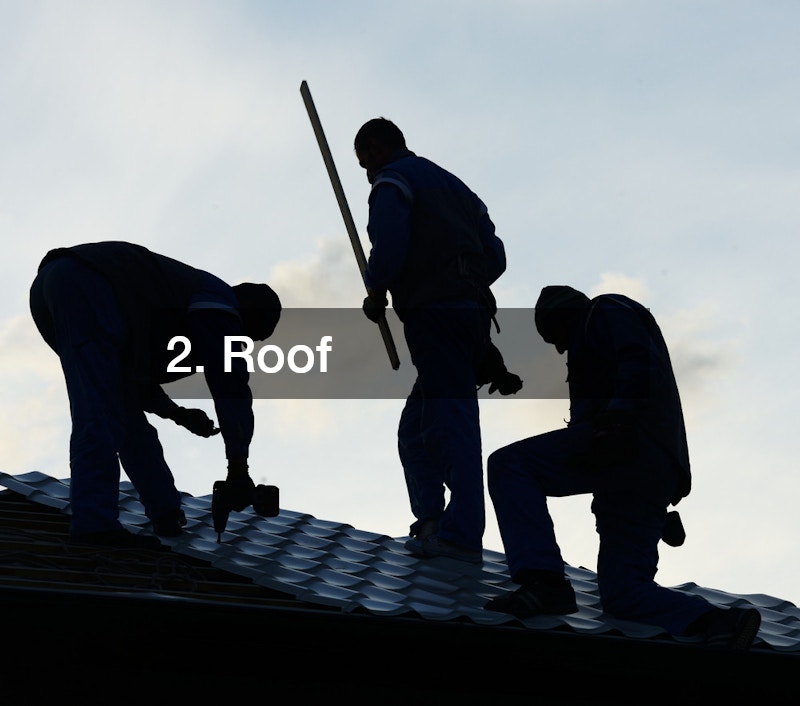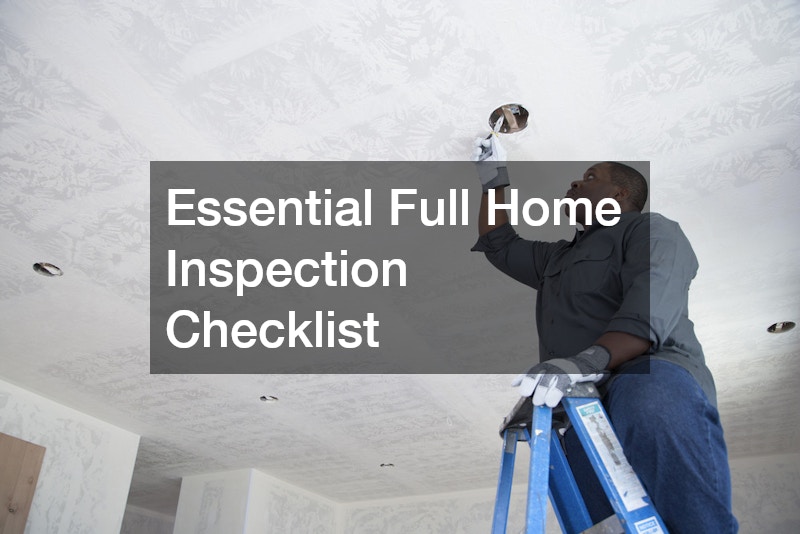Essential Full Home Inspection Checklist
In order to ensure that your home is safe and functional, you should thoroughly inspect several areas. Each component, from the appliances to the roof, plays a vital role in the integrity of your home. Here are the ten most important things to check during a full home inspection.
It’s important to know that a home check is more than a routine inspection. A thorough evaluation of the condition of your property will be performed. Inspectors will examine everything from the foundation up to the electrical system to identify potential issues that may affect the value and safety of your home. This helps uncover hidden problems which may not be visible at first but can lead to costly repairs if ignored.
A thorough home inspection can also provide valuable insight for current homeowners as well as prospective buyers. Sellers can address any problems before listing their property and potentially increase its value. Buyers can make informed decisions after a thorough inspection of the property. A detailed inspection will ensure that your home is in good working order and prevent any costly surprises.
1. Appliances
The condition of your appliances should be one of the first things to be assessed during a complete home inspection. These appliances are essential to everyday life, from refrigerators and dishwashers. All appliances must be in safe working condition and have a good warranty. You may have to hire a licensed microwave to diagnose and fix any problems.
The inspector will test each appliance and look for signs of wear. The inspector will test the temperature in the refrigerator, run a cycle in the dishwasher and check the settings on your stove. To avoid future safety risks or expensive repairs, any issues should be resolved immediately.
You can prevent unexpected breakdowns by thoroughly inspecting all your appliances as part of a home inspection. You will have peace of mind and also maintain the value of the home.
2. Roof

Roofs are another critical component of a home inspection that needs to be thoroughly examined. Your roof is the first line of defense for your home against the elements. It plays an important role in keeping it dry and safe. Check for signs of wear and tear, and make sure the roof is structurally sound.
Roof replacement may be required if the inspector finds any problems with the roof, such as missing or leaking shingles. Roof replacement is a major investment but essential to maintaining the integrity of your house. You can avoid further damage to your roof by addressing roofing problems promptly.
The inspector will check the roof’s overall health, including the gutters and flashing. These components are vital for the health of your roof, and they should be checked regularly to avoid any issues.
3. Door Locks
It’s important to check the condition of your locks when you conduct a complete home inspection. The locks on your doors are an important part of home security. They play a major role in protecting your property. Check that all locks work properly and are secure.
It may be necessary for the inspector to replace or repair the locks if they are found to have any problems, such as broken or loose mechanisms or screws. You can be assured that your home will be well protected and you’ll have peace of mind.
You may have to hire locksmiths to repair or assess any problems with your door lock. Locksmith services will ensure that all locks are working properly and can provide additional security measures for your family and home.
4. Driveway
A full home inspection should also include a thorough look at the driveway. The state of your driveway will affect the curb appeal and functionality of your house. You should always check your driveway for cracks, damage, and potholes.
You may need to hire paving professionals to repair any damage found by the inspector. Paving contractors will restore your driveway back to its original state and make sure it’s safe for use. This will improve the value of your house and enhance its appearance.
During the inspection the inspector will check the drainage around the driveway in order to prevent erosion and water accumulation. It is important to maintain the durability of your driveway as well as prevent any future issues.
5. Chimney
It’s important to assess the condition of your fireplace during a complete home inspection. It is important to maintain the chimney in order to ensure safety and function. Check for signs of wear or damage that need to be addressed.
In the event that the inspector finds any problems with the chimney (such as cracks, deterioration, or other issues), it might be necessary to repair the chimney. Chimney repairs can restore structural integrity to the chimney, preventing any safety hazards. You can keep your fireplace safe and functional by addressing chimney problems promptly.
The inspector will check the clearance around the chimney and the proper ventilation during the inspection to avoid any fire hazards. It is important to maintain the safety of your house, and your chimney should be checked regularly.
6. Drainage and Plumbing Systems
The plumbing system and drains are another essential component to be evaluated as part of a complete home inspection. The plumbing system delivers clean water into your home, and removes wastewater efficiently. Check for leaks, clogs or any other problems that could affect the performance of your system.
In the event that the inspector finds any problems with the plumbing system (such as slow drains or leaky pipes), you may need to hire a drain cleaning service to fix the issue. Drain cleaning services will help eliminate any clogs or buildups that could be causing problems with your plumbing system. This will ensure that your plumbing system operates efficiently and help prevent any water damage to your home.
The inspector will check the water pressure, as well as the condition of the faucets, fixtures, and water heaters. These components are vital for the overall function of your plumbing system. They should be checked regularly to avoid any unexpected problems.
7. Septic System
It’s important to have your septic system inspected as part of a complete home inspection if you own a home with one. It is important to maintain your septic system properly in order to avoid any issues. Check for signs of leaks or damage.
In the event that the inspector finds any problems with the septic, it might be necessary to hire services to repair and assess the problem. Septic services will ensure that your system is working properly and can prevent contamination or backups. Maintaining your septic system can help you avoid expensive repairs and extend its life.
The inspector will assess the condition and state of the components and tank during the inspection. These components are vital to the overall function of your septic tank and should be checked regularly to avoid any issues.
8. The Fireplace

The fireplace is another critical component of a home inspection. It is important to maintain the fireplace to ensure safety and functionality. Check for signs of wear or damage that need to be addressed.
Gas fireplace installation may be recommended if the fireplace inspector finds any problems, such as a cracked chimney or a damaged flue. Gas fireplace installation will improve the safety and efficiency of your fireplace and give you a convenient and clean heating source. Upgrade to a gas fireplace and enjoy the warmth of a fire without having to worry about wood burning.
The inspector will check the clearances and ventilation around the fireplace in order to avoid any fire hazards. It is important to maintain the safety of your house and your fireplace. Regular inspections are necessary to make sure that it is working properly.
9. Water Heater
It’s important to check the condition of your hot water heater during a complete home inspection. Water heaters are responsible for heating water in your home to be used for cleaning, bathing, and cooking. Check for leaks, corrosion, or any other issues which may affect the performance of your heater.
In the event that the inspector finds any problems with the water heater (such as rusty parts or a broken thermostat), it may be necessary for you to hire a water heater repair service to diagnose and fix the problem. Water heater repair can restore your water heater’s functionality and prevent leaks or malfunctions. You can have hot water at home by resolving any water heater problems as soon as possible.
The inspector will check the insulation of the tank and evaluate the condition of its components and other parts. These components are vital for the overall function of your water heater. They should be checked regularly to avoid any unexpected issues.
10. Generator
It’s important to have your generator inspected as part of a complete home inspection if you own one. Generators provide backup power during a blackout, or in an emergency. They should be maintained properly to ensure their functionality. Check for signs of wear or damage that need to be addressed.
In the event that the inspector finds any problems with the generator (such as a worn-out starter or worn components), it might be necessary to install a generator. Installation of a generator can ensure that it is ready to supply backup power in the event of a blackout and avoid any issues. You can be assured that you will always have power in your home if an emergency occurs by investing in a backup generator.
The inspector will check the generator’s fuel supply and ventilation to make sure it’s operating efficiently and safely. Regular maintenance is vital to the life of your generator. It will prevent unexpected breakdowns and malfunctions.
Final Thoughts
An inspection of your home is essential to maintaining its safety and functionality. You can prevent potential problems by thoroughly inspecting your appliances, roof, door locks, and driveway. Also, check the plumbing system, septic tank, fireplace, water heater, and generator. To avoid safety risks or expensive repairs, it’s important to fix any issues that are identified during the home inspection. You can enjoy peace of mind by investing in a thorough home inspection.
Regular home inspections are a proactive measure to ensure the value and longevity of your property. Early detection can prevent costly and extensive repairs in the future. As homes age, wear and tear is inevitable. A comprehensive inspection is a great way to make sure your property will remain safe and comfortable for many years.

